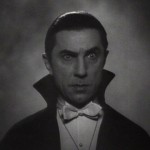Dracula (1931)
by SynRaptor on Oct.11, 2010, under Angry Rants
 Groundbreaking, Pioneering – Could’ve Been So Much More
Groundbreaking, Pioneering – Could’ve Been So Much More
When Universal Studios released Dracula in 1931, it sent shockwaves throughout the movie industry. The film started off the famous ‘Horror Cycle’ which saw the studio produce so many greats of the genre of which I am a big fan (and a few bad ones as well!). It also created nearly every stereotype and cliché associated with the Dracula legend. And yet it has not aged well, and many limitations hold the film back.
Starting with the strong points: Bela Lugosi is without any shadow of a doubt, the greatest Dracula of all-time. He could convey in a single, hypnotic look what Max Schreck could do only with heavy makeup and wonderful photography, what Christopher Lee could do only with gore galore and Gary Oldman could only do with all of modern film-making on his side and more. People sometimes forget that the legendary line ‘I never drink…wine’ is not from the book, but from Bela Lugosi (in the book he says ‘I have already dined and I don’t smoke’). His accent is captivating and his very movement draws you in and makes you want to expose your neck. While many movie fans are tempted to praise Boris Karloff higher for his role as the creature in Frankenstein, I will always prefer Lugosi in Dracula who turns in one of the greatest performances of all-time.
Dwight Frye is also a winner as Renfield. Like Lugosi, he is the best version yet seen of this demented madman with a laugh that will send shivers down your spine. His line about the rats is also a classic. It is perhaps little wonder that Frye was immortalised in song by Alice Cooper in the 1970s in the famous ‘Ballard of Dwight Fry’ (sic).
Edward Van Sloan is also a very fine Van Helsing and although the acting style of the day has aged somewhat he nevertheless puts in a fine showing.
Tod Browning may have to play second fiddle to James Whale in the pantheon of horror directors, but his work is also noteworthy here.
Sadly, despite these fine points, there are numerous faults although very little of it can be blamed on the film. The acting (apart from Lugosi, Van Sloan and Frye) is awful. It is wooden, bland and looks like a first take read from a dummy card. But then this was only four years into the ‘talkie’ era when studios still made films with title cards in-between lines as so many cinemas did not have the technology to play sound. All the established screen actors simply did not know how to talk and stage actors who were drafted in found it difficult to adapt to the screen.
The other major fault is the story and script which is based on the stage-play rather than the book. This was due to financial reasons as the studio’s budget in the great depression was limited, and the elaborate tale dreamed up by Universal in the 1920s, did not fit the world post Wall Street crash. As a result, the film lacks all of the panic and frenzied crescendo of the book and the film nearly dies a death once the ship docks in Whitby (which is in London all of the sudden!). The ending is also a huge anti-climax due to the sensibilities of the day.
The extras on the DVD are enough for me to want to replace my old VHS copy and are a worthy treatment for such a memorable film.
To sum it all up it must be said that you must appreciate the circumstances in which the film was made. When you can look past that, you will see Dracula as he was meant to be seen, not with a ridiculous hair-do or over-done blood but able to make your skin crawl with a single glance. What I wouldn’t give for a time machine that could take Bela Lugosi and Dwight Frye into the modern era to make this film now as it was meant to be made.
Lugosi never lived this part down and was buried wearing a Dracula cape. Re-watching his performance, you half expect him to rise from the grave as the un-dead to drink your blood while you sleep. He came to the screen with the immortal line: ‘I am Dracula’- truer words were never spoken.